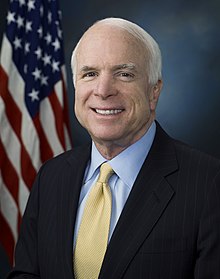
Back John McCain Afrikaans John McCain AN جون ماكين Arabic جون ماكين ARZ John McCain AST Con Makkeyn Azerbaijani جان مککین AZB John McCain BCL Джон Сідні Мак-Кейн Byelorussian Джон Маккейн BE-X-OLD
John McCain | |||||||||||||||||||||||||||||||||||||||||||||||
|---|---|---|---|---|---|---|---|---|---|---|---|---|---|---|---|---|---|---|---|---|---|---|---|---|---|---|---|---|---|---|---|---|---|---|---|---|---|---|---|---|---|---|---|---|---|---|---|
 Official portrait, 2009 | |||||||||||||||||||||||||||||||||||||||||||||||
| United States Senator from Arizona | |||||||||||||||||||||||||||||||||||||||||||||||
| In office January 3, 1987 – August 25, 2018 | |||||||||||||||||||||||||||||||||||||||||||||||
| Preceded by | Barry Goldwater | ||||||||||||||||||||||||||||||||||||||||||||||
| Succeeded by | Jon Kyl | ||||||||||||||||||||||||||||||||||||||||||||||
| Member of the U.S. House of Representatives from Arizona's 1st district | |||||||||||||||||||||||||||||||||||||||||||||||
| In office January 3, 1983 – January 3, 1987 | |||||||||||||||||||||||||||||||||||||||||||||||
| Preceded by | John Jacob Rhodes | ||||||||||||||||||||||||||||||||||||||||||||||
| Succeeded by | John Jacob Rhodes III | ||||||||||||||||||||||||||||||||||||||||||||||
| |||||||||||||||||||||||||||||||||||||||||||||||
| Personal details | |||||||||||||||||||||||||||||||||||||||||||||||
| Born | John Sidney McCain III August 29, 1936 Coco Solo, Panama Canal Zone | ||||||||||||||||||||||||||||||||||||||||||||||
| Died | August 25, 2018 (aged 81) Cornville, Arizona, U.S. | ||||||||||||||||||||||||||||||||||||||||||||||
| Resting place | United States Naval Academy Cemetery | ||||||||||||||||||||||||||||||||||||||||||||||
| Political party | Republican | ||||||||||||||||||||||||||||||||||||||||||||||
| Spouses | |||||||||||||||||||||||||||||||||||||||||||||||
| Children | 7, including Meghan | ||||||||||||||||||||||||||||||||||||||||||||||
| Parents | |||||||||||||||||||||||||||||||||||||||||||||||
| Relatives | Joe McCain (brother) | ||||||||||||||||||||||||||||||||||||||||||||||
| Education | United States Naval Academy (BS) | ||||||||||||||||||||||||||||||||||||||||||||||
| Civilian awards | Presidential Medal of Freedom (posthumous, 2022) | ||||||||||||||||||||||||||||||||||||||||||||||
| Signature |  | ||||||||||||||||||||||||||||||||||||||||||||||
| Website | Senate website | ||||||||||||||||||||||||||||||||||||||||||||||
| Nickname | John Wayne | ||||||||||||||||||||||||||||||||||||||||||||||
| Military service | |||||||||||||||||||||||||||||||||||||||||||||||
| Branch/service | United States Navy | ||||||||||||||||||||||||||||||||||||||||||||||
| Years of service | 1958–1981 | ||||||||||||||||||||||||||||||||||||||||||||||
| Rank | Captain | ||||||||||||||||||||||||||||||||||||||||||||||
| Battles/wars | |||||||||||||||||||||||||||||||||||||||||||||||
| Military awards |
| ||||||||||||||||||||||||||||||||||||||||||||||
John Sidney McCain III (August 29, 1936 – August 25, 2018) was an American politician and United States Navy officer who served as a United States senator from Arizona from 1987 until his death in 2018. He previously served two terms in the United States House of Representatives and was the Republican nominee for president of the United States in the 2008 election, which he lost to Barack Obama.
McCain was a son of Admiral John S. McCain Jr. and grandson of Admiral John S. McCain Sr. He graduated from the United States Naval Academy in 1958 and received a commission in the United States Navy. McCain became a naval aviator and flew ground-attack aircraft from aircraft carriers. During the Vietnam War, he almost died in the 1967 USS Forrestal fire. While on a bombing mission during Operation Rolling Thunder over Hanoi in October 1967, McCain was shot down, seriously injured, and captured by the North Vietnamese. He was a prisoner of war until 1973. McCain experienced episodes of torture and refused an out-of-sequence early release. During the war, he sustained wounds that left him with lifelong physical disabilities. McCain retired from the Navy as a captain in 1981 and moved to Arizona.
In 1982, McCain was elected to the United States House of Representatives, where he served two terms. Four years later, he was elected to the United States Senate, where he served six terms. While generally adhering to conservative principles, McCain also gained a reputation as a "maverick" for his willingness to break from his party on certain issues, including LGBT rights, gun regulations, and campaign finance reform where his stances were more moderate than those of the party's base. McCain was investigated and largely exonerated in a political influence scandal of the 1980s as one of the Keating Five; he then made regulating the financing of political campaigns one of his signature concerns, which eventually resulted in passage of the McCain–Feingold Act in 2002. He was also known for his work in the 1990s to restore diplomatic relations with Vietnam. McCain chaired the Senate Commerce Committee from 1997 to 2001 and 2003 to 2005, where he opposed pork barrel spending and earmarks. He belonged to the bipartisan "Gang of 14", which played a key role in alleviating a crisis over judicial nominations.
McCain entered the race for the Republican presidential nomination in 2000 but lost a heated primary season contest to George W. Bush. He secured the Republican presidential nomination in 2008, beating fellow candidates Mitt Romney and Mike Huckabee, though he lost the general election to Barack Obama. McCain subsequently adopted more orthodox conservative stances and attitudes and largely opposed actions of the Obama administration, especially with regard to foreign policy matters. In 2015, he became Chairman of the Senate Armed Services Committee. He refused to support then-Republican presidential nominee Donald Trump in the 2016 election and later became a vocal critic of the Trump administration. While McCain opposed the Obama-era Affordable Care Act (ACA), he cast the deciding vote against the ACA-repealing American Health Care Act of 2017. After being diagnosed with glioblastoma in 2017, he reduced his role in the Senate to focus on treatment; he died from the disease in 2018.
- ^ Kane, Paul (December 16, 2017). "How the oldest Senate ever is taking a toll on the business of Washington". The Washington Post. Archived from the original on September 27, 2020. Retrieved September 26, 2020.
Cite error: There are <ref group=lower-alpha> tags or {{efn}} templates on this page, but the references will not show without a {{reflist|group=lower-alpha}} template or {{notelist}} template (see the help page).